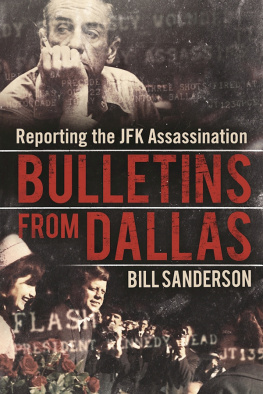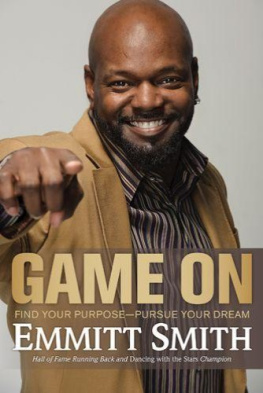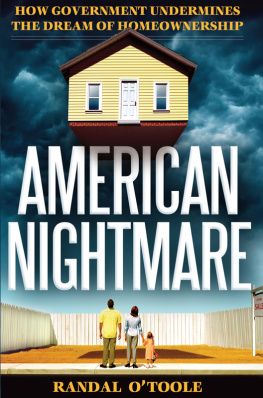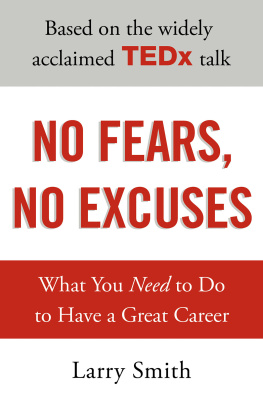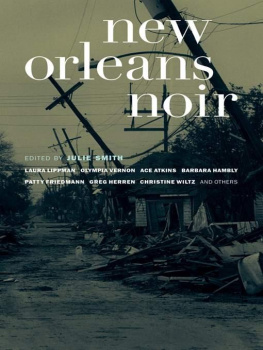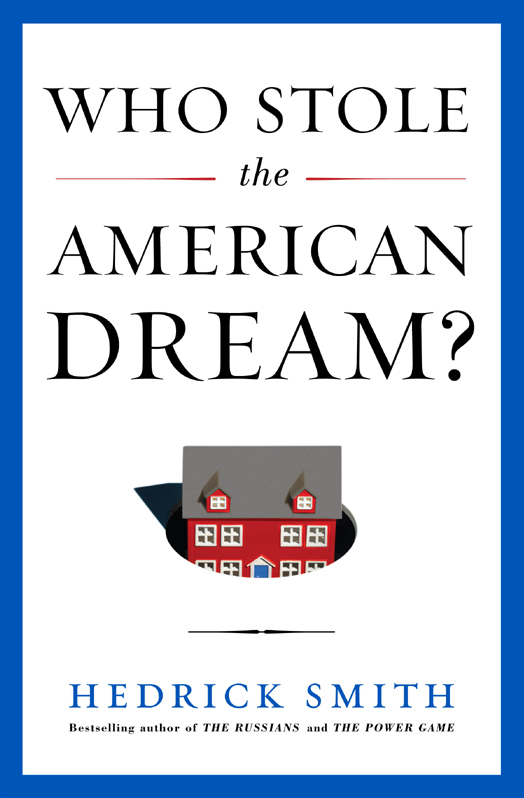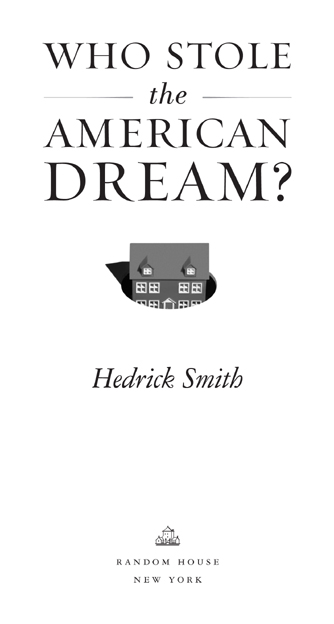Copyright 2012 by Hedrick Smith
All rights reserved.
Published in the United States by Random House, an imprint of The Random House Publishing Group, a division of Random House, Inc., New York.
R ANDOM H OUSE and colophon are registered trademarks of Random House, Inc.
Grateful acknowledgment is made to the WGBH Educational Foundation for permission to reprint previously broadcast material and excerpts from Frontline interviews as follows: Frontlines Poisoned Waters 2009 WGBH Educational Foundation, www.pbs.org/frontline, Frontlines The Card Game 2009 WGBH Educational Foundation, www.pbs.org/frontline, Frontlines Can You Afford to Retire? 2006 WGBH Educational Foundation, www.pbs.org/frontline, Frontlines The Wall Street Fix 2003 WGBH Educational Foundation, www.pbs.org/frontline, Frontlines Is Wal-Mart Good for America? 2004 WGBH Educational Foundation, www.pbs.org/frontline.
Used by permission.
Library of Congress Cataloging-in-Publication Data
Smith, Hedrick.
Who stole the American dream? / by Hedrick Smith.
p. cm.
eISBN: 978-0-679-60464-8
1. United StatesPolitics and government19451989. 2. United StatesPolitics and government1989 3. Political cultureUnited StatesHistory20th century. 4. Political cultureUnited StatesHistory21st century. 5. Polarization (Social sciences)United States. 6. Middle classUnited StatesEconomic conditions. 7. Middle classPolitical activityUnited States. 8. Public interestUnited States. 9. Income distributionUnited States. 10. Divided governmentUnited States. I. Title.
E839.5.S59 2012 973.91dc23 2012005865
www.atrandom.com
Jacket design: Chris Sergio
Jacket image: Tooga/Getty Images
v3.1_r1
We must make our choice. We may have democracy, or we may have wealth concentrated in the hands of a few, but we cant have both.
LOUIS D. BRANDEIS ,
adviser to President Woodrow Wilson
PROLOGUE
THE CHALLENGE FROM WITHIN
We are treading the edge of a precipice here. Civilizations die of disenchantment. If enough people doubt their society, the whole venture falls apart. We must never let anger, fashionable cynicism, or political partisanship blur our vision on that point. We must not despair of the Republic.
JOHN W. GARDNER ,
cabinet secretary to President Lyndon Johnson
Thus, it is manifest that the best political community is formed by citizens of the middle class, and that those states are likely to be well-administered in which the middle class is large, and stronger if possible than both other classes.
ARISTOTLE ,
Politics
IN HIS MAGISTERIAL WORK A Study of History, British historian Arnold J. Toynbee tells the story of how civilizations rise and fall through the dynamics of challenge and response. After studying twenty-one civilizations across six thousand years, Toynbee found that the fate of each civilization was determined by its response to the challenges it faced.
Ancient Egypt rose to enduring greatness, Toynbee reported, by overcoming the challenge of a hostile climate with a sophisticated system of agriculture. In South America, the Mayan and Andean civilizations overcame similar environmental hardships but perished before the challenge of more powerful invaders. Other civilizations collapsed from within. The city-states of ancient Greece fell into fierce competition among themselves over trade and spiraled into decline from fratricidal warfare. Ancient Rome fell victim to what Toynbee called a schism in the body social and a schism in the soulinternal divisions that undermined Romes unity at the core.
In the twentieth century, America met and overcame the military challenge of mortal enemiesHitlers Germany and then the prolonged global challenge of Soviet communism.
Today we face a more complicated and potentially more dangerous challengea challenge from within. Like ancient Rome, we are in danger of causing or contributing to our own downfall by having spawned the schisms that Toynbee talked aboutschisms in the body politic and in the soul of our society.
A House Divided: Two Americas
Over the past three decades, we have become Two Americas. We are no longer one large American family with shared prosperity and shared political and economic power, as we were in the decades following World War II. Today, no common enemy unites us as a nation. No common enterprise like settling the West or rocketing to the moon inspires us as a people.
We are today a sharply divided countrydivided by power, money, and ideology. Our politics have become rancorous and polarized, our political leaders unable to resolve the most basic problems. Constant conflict has replaced a sense of common purpose and the pursuit of the common welfare. Not just in Washington, but across the nation, the fault lines that divide us run deep, and they are profoundly self-destructive, unless we can find our way to some new unity and consensus.
Abraham Lincoln gave us fair warning. A house divided against itself, Lincoln said, cannot stand.
Americans sense that something is profoundly wrongthat we have gone off track as a nation. Many skilled observers write about this, but it is hard to grasp exactly how we arrived at our present predicament or how to respondhow to go about healing Americas dangerous divide. The causes do not lie in the last election or the one before that. They predate the financial collapse of 2008. The timeline to our modern national quagmire lies embedded in the longer arc of our history, and that history, from 1971 to the present, is the focus of this book.
Hidden Beginnings
History often has hidden beginnings. There is no blinding flash of light in the sky to mark a turning point, no distinctive mushroom cloud signifying an atomic explosion that will forever alter human destiny. Often a watershed is crossed in some gradual and obscure way so that most people do not realize that an unseen shift has moved them into a new era, reshaping their lives, the lives of their generation, and the lives of their children, too. Only decades later do historians, like detectives, sift through the confusing strands of the past and discover a hitherto unknown pregnant beginning.
One such hidden beginning, with powerful impact on our lives today, occurred in 1971 with the Powell Memorandum. The memo, first unearthed by others many years ago, was written by Lewis Powell, then one of Americas most respected and influential corporate attorneys, two months before he was named to the Supreme Court. But it remains a discovery for many people today to learn that the Powell memo sparked a business and corporate rebellion that would forever change the landscape of power in Washington and would influence our policies and economy even now.
The Powell memo was a business manifesto, a call to arms to Corporate America, and it triggered a powerful response. The seismic shift of power that it set in motion marked a fault line in our history. Political revolt had been brewing on the right since the presidential candidacy in 1964 of Senator Barry Goldwater, the anti-union, free market conservative from Arizona, but it was the Powell memo that lit the spark of change. It ignited a long period of sweeping transformations both in Washingtons policies and in the mind-set and practices of American business leaderstransformations that reversed the politics and policies of the postwar era and the virtuous circle philosophy that had created the broad prosperity of Americas middle class.


